Aboriginal Social and Emotional Wellbeing vs. Mental Health: NUR3030
VerifiedAdded on 2022/11/30
|8
|2347
|267
Report
AI Summary
This report, prepared for the NUR3030 course, critically analyzes the Indigenous definitions of social and emotional wellbeing in comparison to Western definitions of mental health. It explores the multidimensional nature of Indigenous wellbeing, encompassing culture, spirituality, and community, contrasting it with the more problem-focused approach of mental health. The report delves into the characteristics and evolution of Aboriginal Medical Services, highlighting their role in providing culturally appropriate healthcare based on primary health care principles. It examines the application of social and emotional wellbeing programs within Aboriginal communities, referencing key organizations and initiatives. The report concludes by emphasizing the importance of culturally sensitive approaches to address mental and emotional concerns within the Aboriginal and Torres Strait Islander communities, advocating for holistic care that integrates compassion, education, and cultural understanding. The student's assignment provides a detailed comparison of these two perspectives and their implications for healthcare practices.
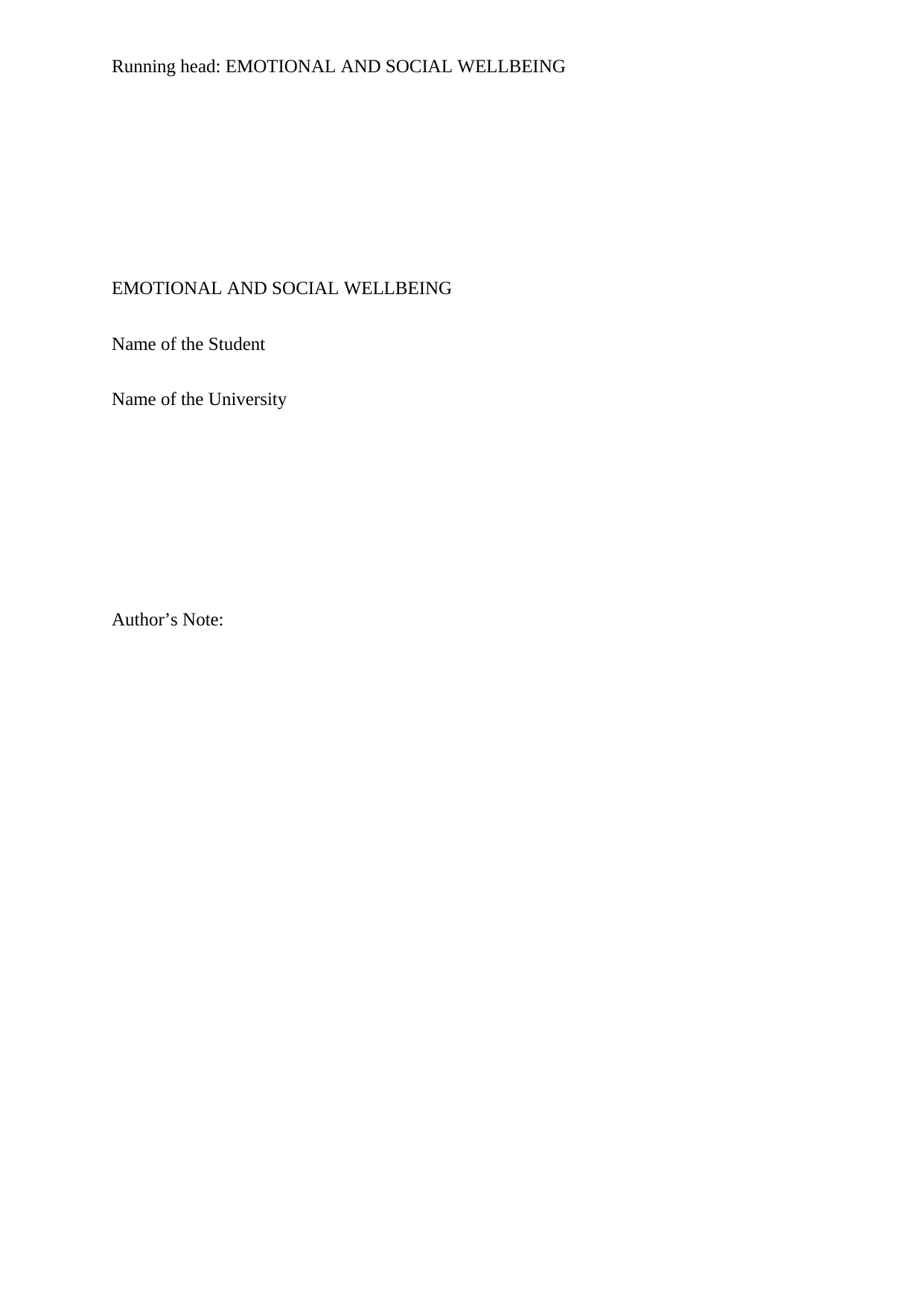
Running head: EMOTIONAL AND SOCIAL WELLBEING
EMOTIONAL AND SOCIAL WELLBEING
Name of the Student
Name of the University
Author’s Note:
EMOTIONAL AND SOCIAL WELLBEING
Name of the Student
Name of the University
Author’s Note:
Paraphrase This Document
Need a fresh take? Get an instant paraphrase of this document with our AI Paraphraser
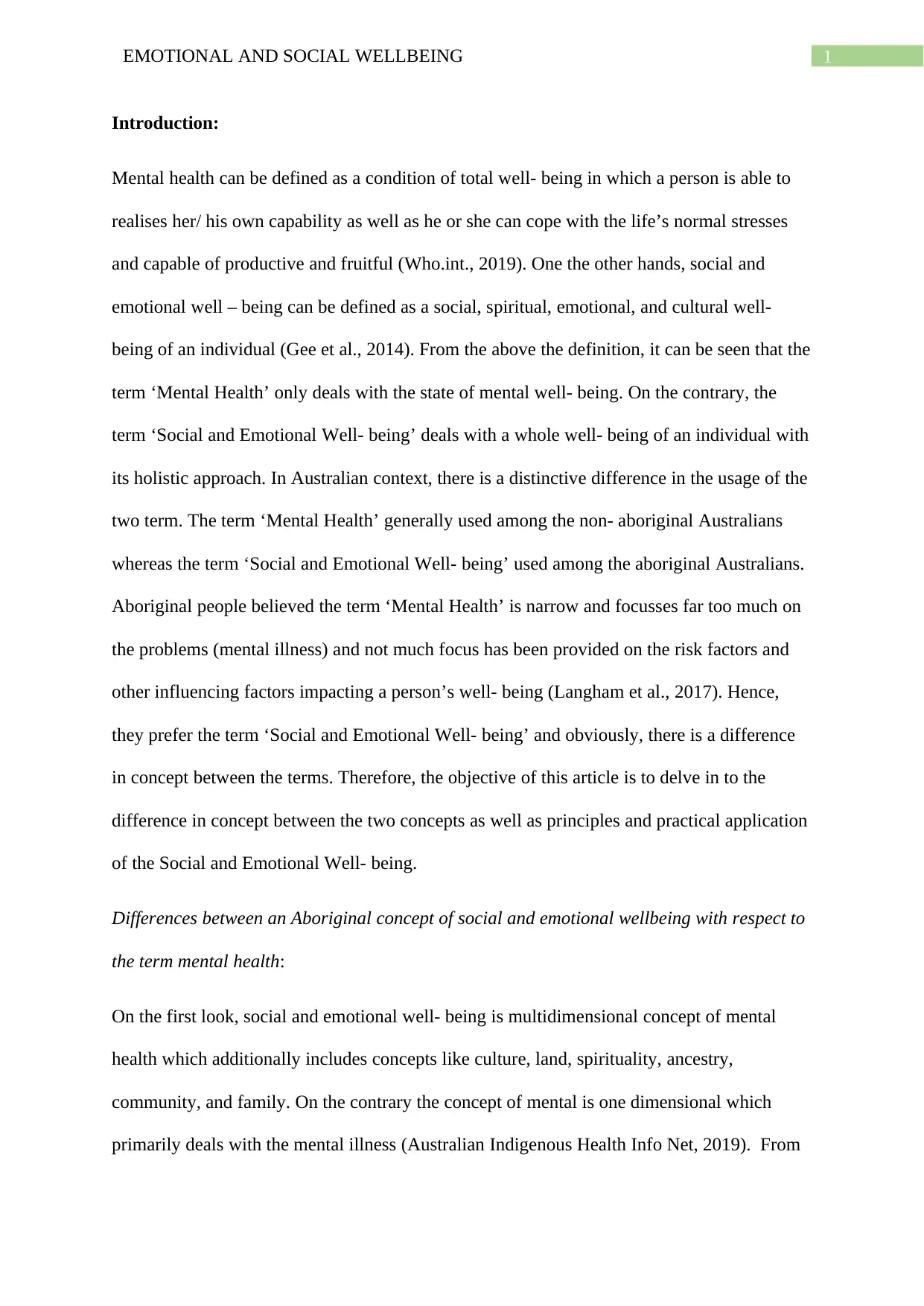
1EMOTIONAL AND SOCIAL WELLBEING
Introduction:
Mental health can be defined as a condition of total well- being in which a person is able to
realises her/ his own capability as well as he or she can cope with the life’s normal stresses
and capable of productive and fruitful (Who.int., 2019). One the other hands, social and
emotional well – being can be defined as a social, spiritual, emotional, and cultural well-
being of an individual (Gee et al., 2014). From the above the definition, it can be seen that the
term ‘Mental Health’ only deals with the state of mental well- being. On the contrary, the
term ‘Social and Emotional Well- being’ deals with a whole well- being of an individual with
its holistic approach. In Australian context, there is a distinctive difference in the usage of the
two term. The term ‘Mental Health’ generally used among the non- aboriginal Australians
whereas the term ‘Social and Emotional Well- being’ used among the aboriginal Australians.
Aboriginal people believed the term ‘Mental Health’ is narrow and focusses far too much on
the problems (mental illness) and not much focus has been provided on the risk factors and
other influencing factors impacting a person’s well- being (Langham et al., 2017). Hence,
they prefer the term ‘Social and Emotional Well- being’ and obviously, there is a difference
in concept between the terms. Therefore, the objective of this article is to delve in to the
difference in concept between the two concepts as well as principles and practical application
of the Social and Emotional Well- being.
Differences between an Aboriginal concept of social and emotional wellbeing with respect to
the term mental health:
On the first look, social and emotional well- being is multidimensional concept of mental
health which additionally includes concepts like culture, land, spirituality, ancestry,
community, and family. On the contrary the concept of mental is one dimensional which
primarily deals with the mental illness (Australian Indigenous Health Info Net, 2019). From
Introduction:
Mental health can be defined as a condition of total well- being in which a person is able to
realises her/ his own capability as well as he or she can cope with the life’s normal stresses
and capable of productive and fruitful (Who.int., 2019). One the other hands, social and
emotional well – being can be defined as a social, spiritual, emotional, and cultural well-
being of an individual (Gee et al., 2014). From the above the definition, it can be seen that the
term ‘Mental Health’ only deals with the state of mental well- being. On the contrary, the
term ‘Social and Emotional Well- being’ deals with a whole well- being of an individual with
its holistic approach. In Australian context, there is a distinctive difference in the usage of the
two term. The term ‘Mental Health’ generally used among the non- aboriginal Australians
whereas the term ‘Social and Emotional Well- being’ used among the aboriginal Australians.
Aboriginal people believed the term ‘Mental Health’ is narrow and focusses far too much on
the problems (mental illness) and not much focus has been provided on the risk factors and
other influencing factors impacting a person’s well- being (Langham et al., 2017). Hence,
they prefer the term ‘Social and Emotional Well- being’ and obviously, there is a difference
in concept between the terms. Therefore, the objective of this article is to delve in to the
difference in concept between the two concepts as well as principles and practical application
of the Social and Emotional Well- being.
Differences between an Aboriginal concept of social and emotional wellbeing with respect to
the term mental health:
On the first look, social and emotional well- being is multidimensional concept of mental
health which additionally includes concepts like culture, land, spirituality, ancestry,
community, and family. On the contrary the concept of mental is one dimensional which
primarily deals with the mental illness (Australian Indigenous Health Info Net, 2019). From
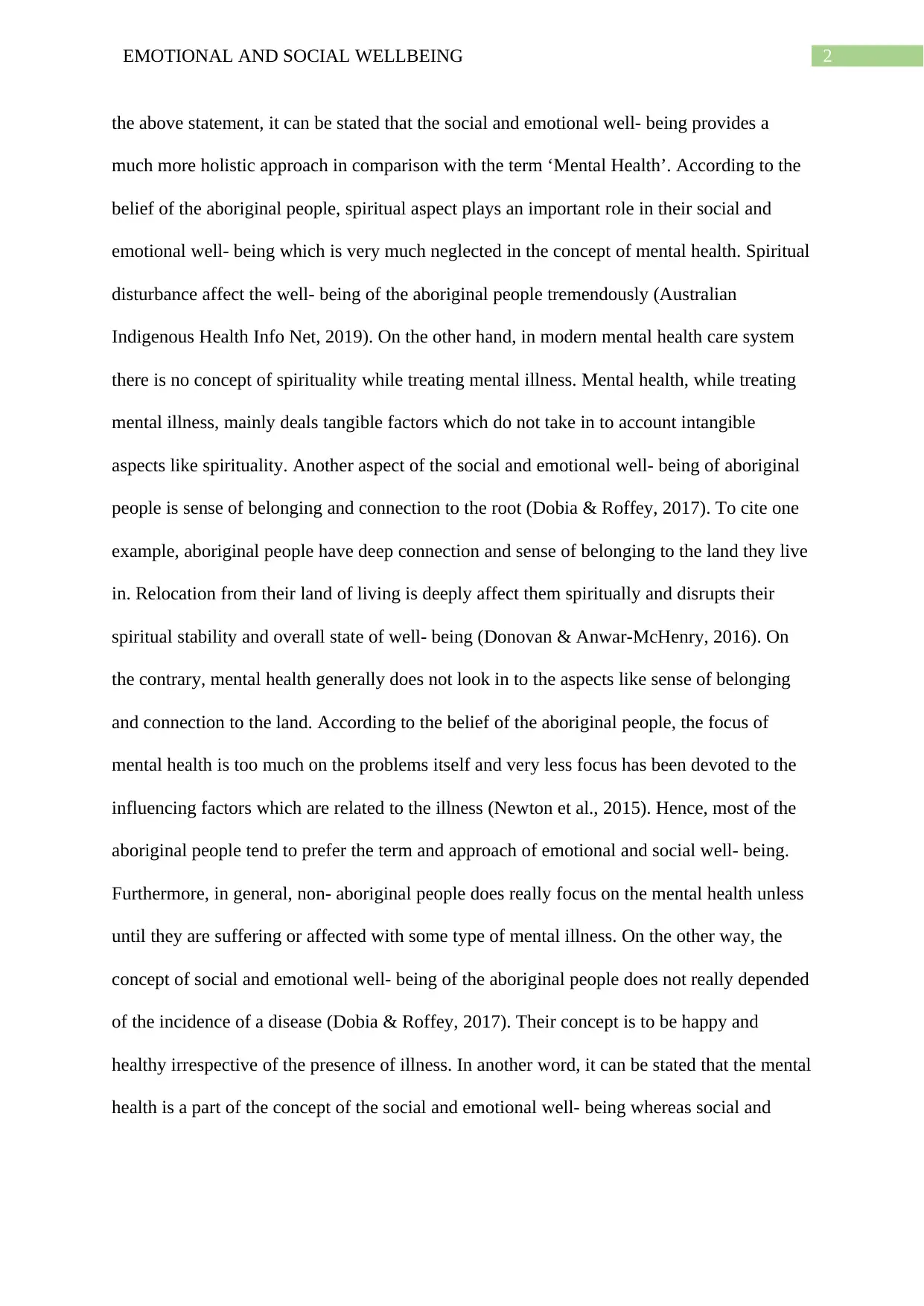
2EMOTIONAL AND SOCIAL WELLBEING
the above statement, it can be stated that the social and emotional well- being provides a
much more holistic approach in comparison with the term ‘Mental Health’. According to the
belief of the aboriginal people, spiritual aspect plays an important role in their social and
emotional well- being which is very much neglected in the concept of mental health. Spiritual
disturbance affect the well- being of the aboriginal people tremendously (Australian
Indigenous Health Info Net, 2019). On the other hand, in modern mental health care system
there is no concept of spirituality while treating mental illness. Mental health, while treating
mental illness, mainly deals tangible factors which do not take in to account intangible
aspects like spirituality. Another aspect of the social and emotional well- being of aboriginal
people is sense of belonging and connection to the root (Dobia & Roffey, 2017). To cite one
example, aboriginal people have deep connection and sense of belonging to the land they live
in. Relocation from their land of living is deeply affect them spiritually and disrupts their
spiritual stability and overall state of well- being (Donovan & Anwar-McHenry, 2016). On
the contrary, mental health generally does not look in to the aspects like sense of belonging
and connection to the land. According to the belief of the aboriginal people, the focus of
mental health is too much on the problems itself and very less focus has been devoted to the
influencing factors which are related to the illness (Newton et al., 2015). Hence, most of the
aboriginal people tend to prefer the term and approach of emotional and social well- being.
Furthermore, in general, non- aboriginal people does really focus on the mental health unless
until they are suffering or affected with some type of mental illness. On the other way, the
concept of social and emotional well- being of the aboriginal people does not really depended
of the incidence of a disease (Dobia & Roffey, 2017). Their concept is to be happy and
healthy irrespective of the presence of illness. In another word, it can be stated that the mental
health is a part of the concept of the social and emotional well- being whereas social and
the above statement, it can be stated that the social and emotional well- being provides a
much more holistic approach in comparison with the term ‘Mental Health’. According to the
belief of the aboriginal people, spiritual aspect plays an important role in their social and
emotional well- being which is very much neglected in the concept of mental health. Spiritual
disturbance affect the well- being of the aboriginal people tremendously (Australian
Indigenous Health Info Net, 2019). On the other hand, in modern mental health care system
there is no concept of spirituality while treating mental illness. Mental health, while treating
mental illness, mainly deals tangible factors which do not take in to account intangible
aspects like spirituality. Another aspect of the social and emotional well- being of aboriginal
people is sense of belonging and connection to the root (Dobia & Roffey, 2017). To cite one
example, aboriginal people have deep connection and sense of belonging to the land they live
in. Relocation from their land of living is deeply affect them spiritually and disrupts their
spiritual stability and overall state of well- being (Donovan & Anwar-McHenry, 2016). On
the contrary, mental health generally does not look in to the aspects like sense of belonging
and connection to the land. According to the belief of the aboriginal people, the focus of
mental health is too much on the problems itself and very less focus has been devoted to the
influencing factors which are related to the illness (Newton et al., 2015). Hence, most of the
aboriginal people tend to prefer the term and approach of emotional and social well- being.
Furthermore, in general, non- aboriginal people does really focus on the mental health unless
until they are suffering or affected with some type of mental illness. On the other way, the
concept of social and emotional well- being of the aboriginal people does not really depended
of the incidence of a disease (Dobia & Roffey, 2017). Their concept is to be happy and
healthy irrespective of the presence of illness. In another word, it can be stated that the mental
health is a part of the concept of the social and emotional well- being whereas social and
⊘ This is a preview!⊘
Do you want full access?
Subscribe today to unlock all pages.

Trusted by 1+ million students worldwide
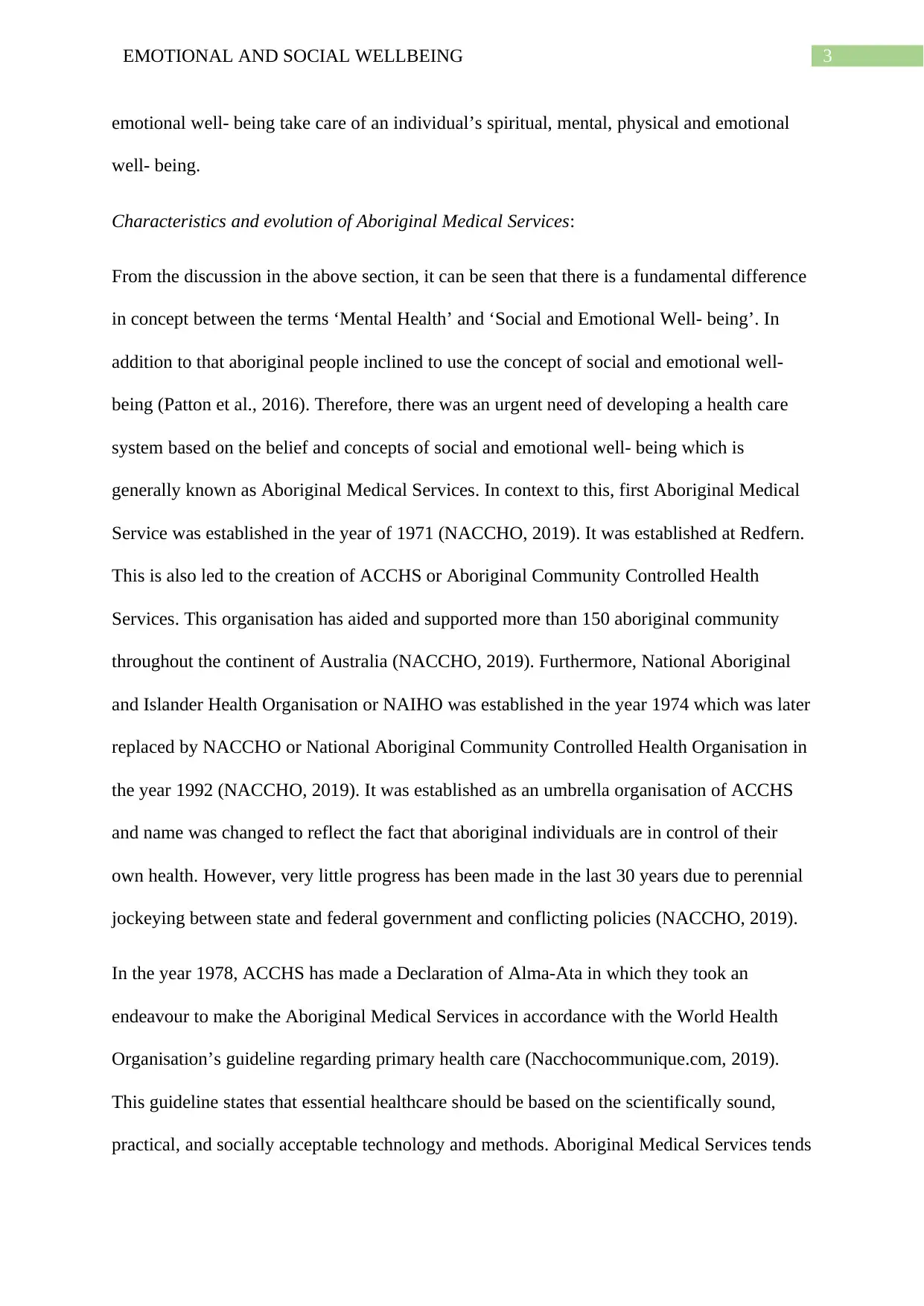
3EMOTIONAL AND SOCIAL WELLBEING
emotional well- being take care of an individual’s spiritual, mental, physical and emotional
well- being.
Characteristics and evolution of Aboriginal Medical Services:
From the discussion in the above section, it can be seen that there is a fundamental difference
in concept between the terms ‘Mental Health’ and ‘Social and Emotional Well- being’. In
addition to that aboriginal people inclined to use the concept of social and emotional well-
being (Patton et al., 2016). Therefore, there was an urgent need of developing a health care
system based on the belief and concepts of social and emotional well- being which is
generally known as Aboriginal Medical Services. In context to this, first Aboriginal Medical
Service was established in the year of 1971 (NACCHO, 2019). It was established at Redfern.
This is also led to the creation of ACCHS or Aboriginal Community Controlled Health
Services. This organisation has aided and supported more than 150 aboriginal community
throughout the continent of Australia (NACCHO, 2019). Furthermore, National Aboriginal
and Islander Health Organisation or NAIHO was established in the year 1974 which was later
replaced by NACCHO or National Aboriginal Community Controlled Health Organisation in
the year 1992 (NACCHO, 2019). It was established as an umbrella organisation of ACCHS
and name was changed to reflect the fact that aboriginal individuals are in control of their
own health. However, very little progress has been made in the last 30 years due to perennial
jockeying between state and federal government and conflicting policies (NACCHO, 2019).
In the year 1978, ACCHS has made a Declaration of Alma-Ata in which they took an
endeavour to make the Aboriginal Medical Services in accordance with the World Health
Organisation’s guideline regarding primary health care (Nacchocommunique.com, 2019).
This guideline states that essential healthcare should be based on the scientifically sound,
practical, and socially acceptable technology and methods. Aboriginal Medical Services tends
emotional well- being take care of an individual’s spiritual, mental, physical and emotional
well- being.
Characteristics and evolution of Aboriginal Medical Services:
From the discussion in the above section, it can be seen that there is a fundamental difference
in concept between the terms ‘Mental Health’ and ‘Social and Emotional Well- being’. In
addition to that aboriginal people inclined to use the concept of social and emotional well-
being (Patton et al., 2016). Therefore, there was an urgent need of developing a health care
system based on the belief and concepts of social and emotional well- being which is
generally known as Aboriginal Medical Services. In context to this, first Aboriginal Medical
Service was established in the year of 1971 (NACCHO, 2019). It was established at Redfern.
This is also led to the creation of ACCHS or Aboriginal Community Controlled Health
Services. This organisation has aided and supported more than 150 aboriginal community
throughout the continent of Australia (NACCHO, 2019). Furthermore, National Aboriginal
and Islander Health Organisation or NAIHO was established in the year 1974 which was later
replaced by NACCHO or National Aboriginal Community Controlled Health Organisation in
the year 1992 (NACCHO, 2019). It was established as an umbrella organisation of ACCHS
and name was changed to reflect the fact that aboriginal individuals are in control of their
own health. However, very little progress has been made in the last 30 years due to perennial
jockeying between state and federal government and conflicting policies (NACCHO, 2019).
In the year 1978, ACCHS has made a Declaration of Alma-Ata in which they took an
endeavour to make the Aboriginal Medical Services in accordance with the World Health
Organisation’s guideline regarding primary health care (Nacchocommunique.com, 2019).
This guideline states that essential healthcare should be based on the scientifically sound,
practical, and socially acceptable technology and methods. Aboriginal Medical Services tends
Paraphrase This Document
Need a fresh take? Get an instant paraphrase of this document with our AI Paraphraser
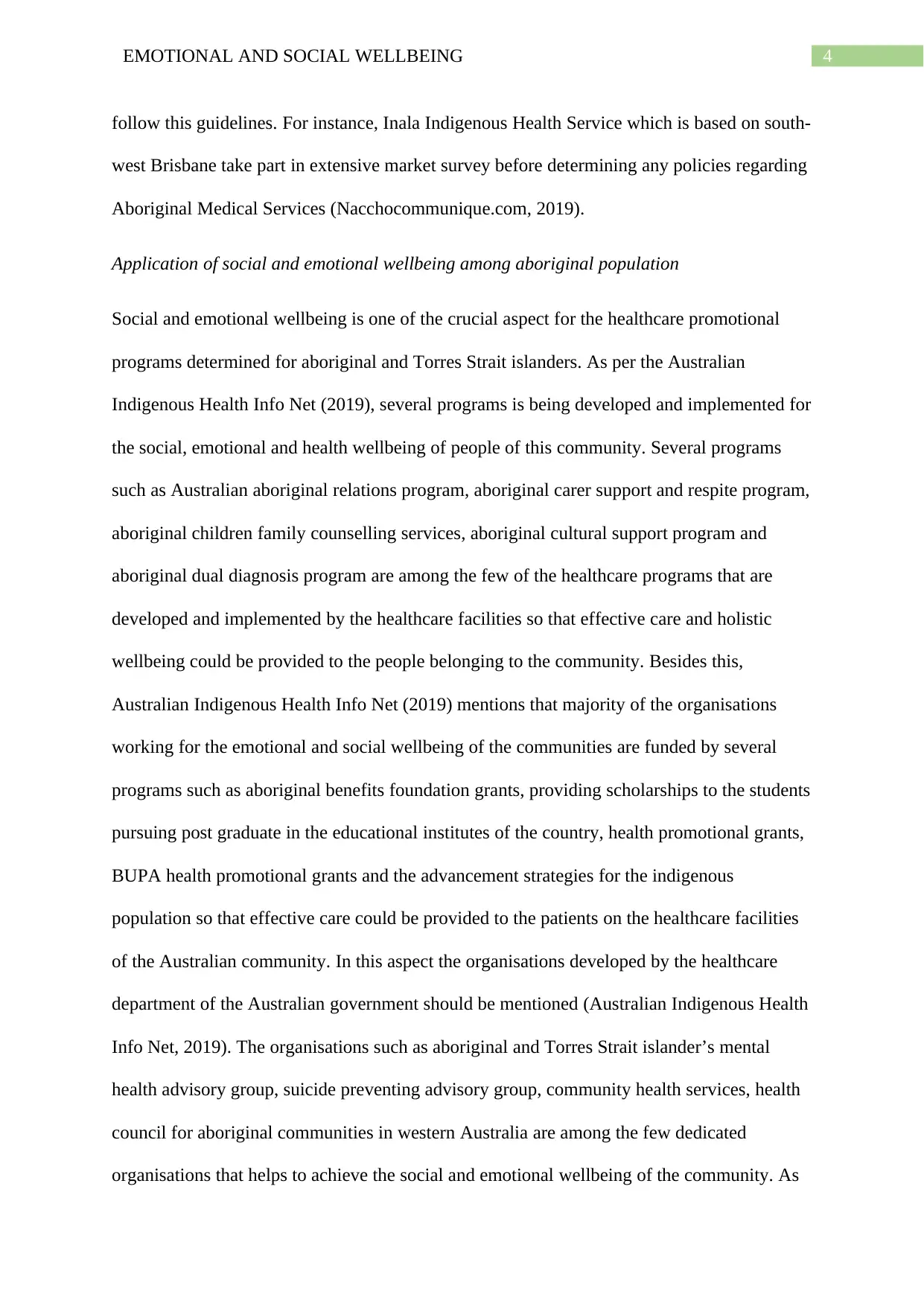
4EMOTIONAL AND SOCIAL WELLBEING
follow this guidelines. For instance, Inala Indigenous Health Service which is based on south-
west Brisbane take part in extensive market survey before determining any policies regarding
Aboriginal Medical Services (Nacchocommunique.com, 2019).
Application of social and emotional wellbeing among aboriginal population
Social and emotional wellbeing is one of the crucial aspect for the healthcare promotional
programs determined for aboriginal and Torres Strait islanders. As per the Australian
Indigenous Health Info Net (2019), several programs is being developed and implemented for
the social, emotional and health wellbeing of people of this community. Several programs
such as Australian aboriginal relations program, aboriginal carer support and respite program,
aboriginal children family counselling services, aboriginal cultural support program and
aboriginal dual diagnosis program are among the few of the healthcare programs that are
developed and implemented by the healthcare facilities so that effective care and holistic
wellbeing could be provided to the people belonging to the community. Besides this,
Australian Indigenous Health Info Net (2019) mentions that majority of the organisations
working for the emotional and social wellbeing of the communities are funded by several
programs such as aboriginal benefits foundation grants, providing scholarships to the students
pursuing post graduate in the educational institutes of the country, health promotional grants,
BUPA health promotional grants and the advancement strategies for the indigenous
population so that effective care could be provided to the patients on the healthcare facilities
of the Australian community. In this aspect the organisations developed by the healthcare
department of the Australian government should be mentioned (Australian Indigenous Health
Info Net, 2019). The organisations such as aboriginal and Torres Strait islander’s mental
health advisory group, suicide preventing advisory group, community health services, health
council for aboriginal communities in western Australia are among the few dedicated
organisations that helps to achieve the social and emotional wellbeing of the community. As
follow this guidelines. For instance, Inala Indigenous Health Service which is based on south-
west Brisbane take part in extensive market survey before determining any policies regarding
Aboriginal Medical Services (Nacchocommunique.com, 2019).
Application of social and emotional wellbeing among aboriginal population
Social and emotional wellbeing is one of the crucial aspect for the healthcare promotional
programs determined for aboriginal and Torres Strait islanders. As per the Australian
Indigenous Health Info Net (2019), several programs is being developed and implemented for
the social, emotional and health wellbeing of people of this community. Several programs
such as Australian aboriginal relations program, aboriginal carer support and respite program,
aboriginal children family counselling services, aboriginal cultural support program and
aboriginal dual diagnosis program are among the few of the healthcare programs that are
developed and implemented by the healthcare facilities so that effective care and holistic
wellbeing could be provided to the people belonging to the community. Besides this,
Australian Indigenous Health Info Net (2019) mentions that majority of the organisations
working for the emotional and social wellbeing of the communities are funded by several
programs such as aboriginal benefits foundation grants, providing scholarships to the students
pursuing post graduate in the educational institutes of the country, health promotional grants,
BUPA health promotional grants and the advancement strategies for the indigenous
population so that effective care could be provided to the patients on the healthcare facilities
of the Australian community. In this aspect the organisations developed by the healthcare
department of the Australian government should be mentioned (Australian Indigenous Health
Info Net, 2019). The organisations such as aboriginal and Torres Strait islander’s mental
health advisory group, suicide preventing advisory group, community health services, health
council for aboriginal communities in western Australia are among the few dedicated
organisations that helps to achieve the social and emotional wellbeing of the community. As
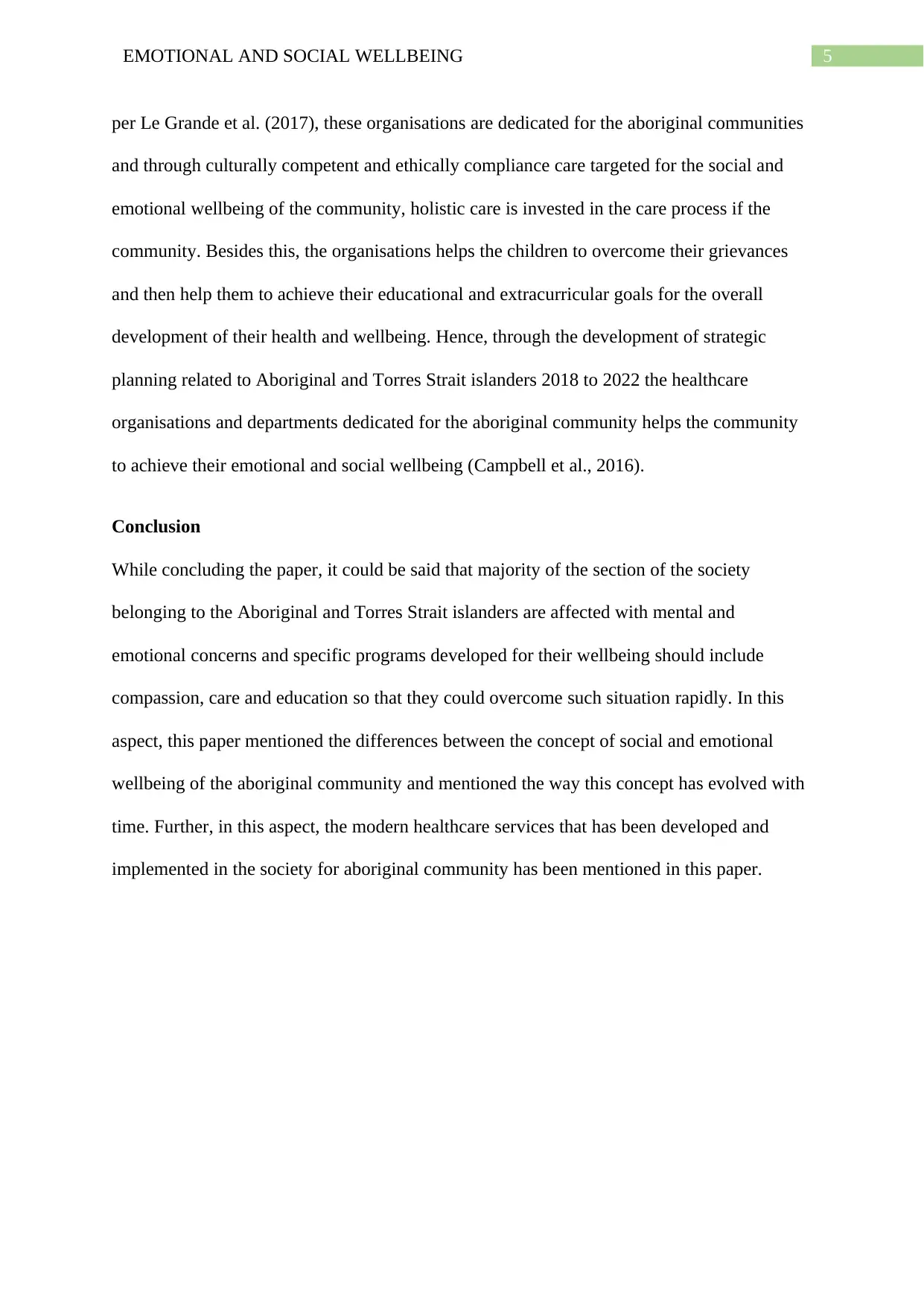
5EMOTIONAL AND SOCIAL WELLBEING
per Le Grande et al. (2017), these organisations are dedicated for the aboriginal communities
and through culturally competent and ethically compliance care targeted for the social and
emotional wellbeing of the community, holistic care is invested in the care process if the
community. Besides this, the organisations helps the children to overcome their grievances
and then help them to achieve their educational and extracurricular goals for the overall
development of their health and wellbeing. Hence, through the development of strategic
planning related to Aboriginal and Torres Strait islanders 2018 to 2022 the healthcare
organisations and departments dedicated for the aboriginal community helps the community
to achieve their emotional and social wellbeing (Campbell et al., 2016).
Conclusion
While concluding the paper, it could be said that majority of the section of the society
belonging to the Aboriginal and Torres Strait islanders are affected with mental and
emotional concerns and specific programs developed for their wellbeing should include
compassion, care and education so that they could overcome such situation rapidly. In this
aspect, this paper mentioned the differences between the concept of social and emotional
wellbeing of the aboriginal community and mentioned the way this concept has evolved with
time. Further, in this aspect, the modern healthcare services that has been developed and
implemented in the society for aboriginal community has been mentioned in this paper.
per Le Grande et al. (2017), these organisations are dedicated for the aboriginal communities
and through culturally competent and ethically compliance care targeted for the social and
emotional wellbeing of the community, holistic care is invested in the care process if the
community. Besides this, the organisations helps the children to overcome their grievances
and then help them to achieve their educational and extracurricular goals for the overall
development of their health and wellbeing. Hence, through the development of strategic
planning related to Aboriginal and Torres Strait islanders 2018 to 2022 the healthcare
organisations and departments dedicated for the aboriginal community helps the community
to achieve their emotional and social wellbeing (Campbell et al., 2016).
Conclusion
While concluding the paper, it could be said that majority of the section of the society
belonging to the Aboriginal and Torres Strait islanders are affected with mental and
emotional concerns and specific programs developed for their wellbeing should include
compassion, care and education so that they could overcome such situation rapidly. In this
aspect, this paper mentioned the differences between the concept of social and emotional
wellbeing of the aboriginal community and mentioned the way this concept has evolved with
time. Further, in this aspect, the modern healthcare services that has been developed and
implemented in the society for aboriginal community has been mentioned in this paper.
⊘ This is a preview!⊘
Do you want full access?
Subscribe today to unlock all pages.

Trusted by 1+ million students worldwide
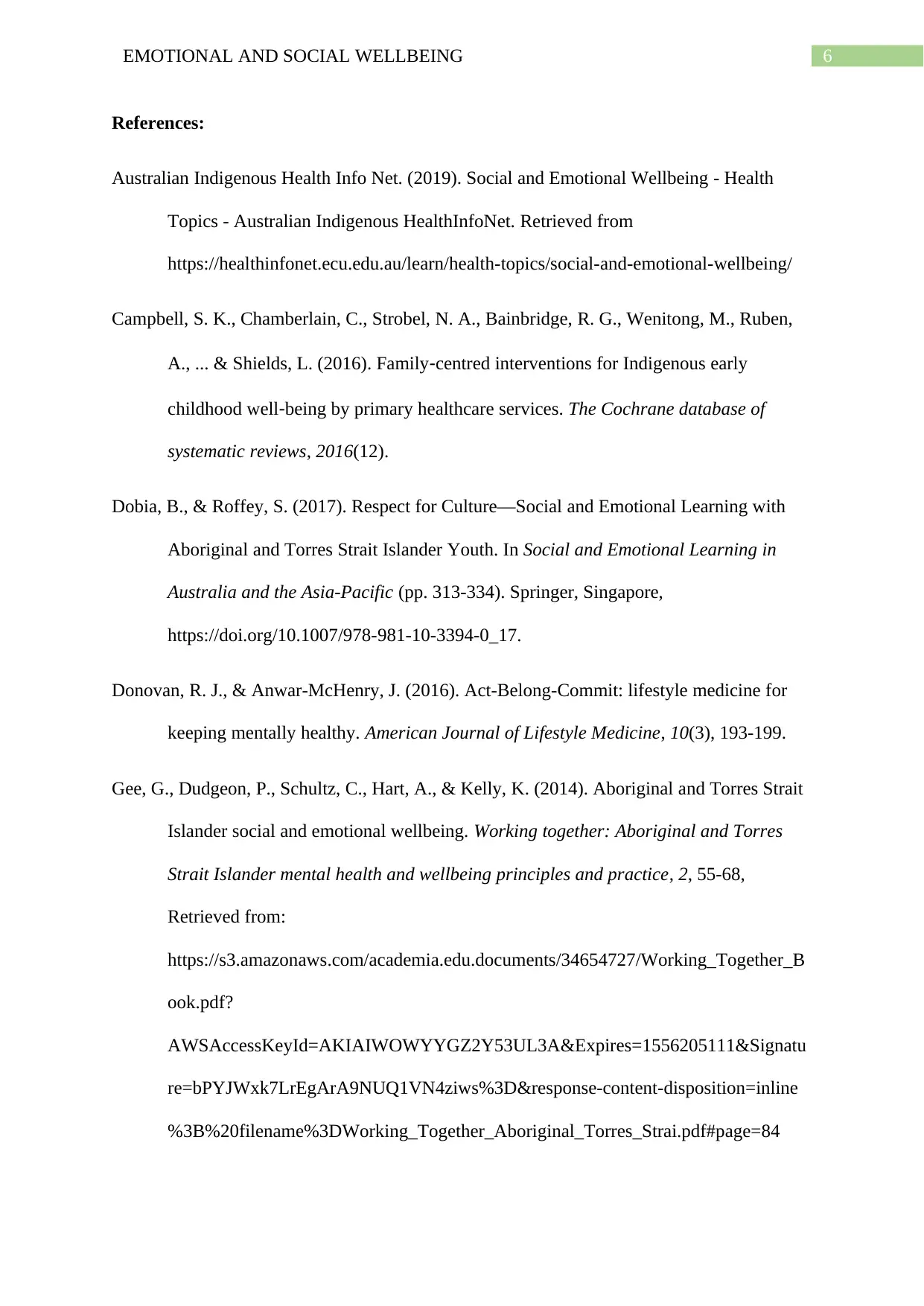
6EMOTIONAL AND SOCIAL WELLBEING
References:
Australian Indigenous Health Info Net. (2019). Social and Emotional Wellbeing - Health
Topics - Australian Indigenous HealthInfoNet. Retrieved from
https://healthinfonet.ecu.edu.au/learn/health-topics/social-and-emotional-wellbeing/
Campbell, S. K., Chamberlain, C., Strobel, N. A., Bainbridge, R. G., Wenitong, M., Ruben,
A., ... & Shields, L. (2016). Family‐centred interventions for Indigenous early
childhood well‐being by primary healthcare services. The Cochrane database of
systematic reviews, 2016(12).
Dobia, B., & Roffey, S. (2017). Respect for Culture—Social and Emotional Learning with
Aboriginal and Torres Strait Islander Youth. In Social and Emotional Learning in
Australia and the Asia-Pacific (pp. 313-334). Springer, Singapore,
https://doi.org/10.1007/978-981-10-3394-0_17.
Donovan, R. J., & Anwar-McHenry, J. (2016). Act-Belong-Commit: lifestyle medicine for
keeping mentally healthy. American Journal of Lifestyle Medicine, 10(3), 193-199.
Gee, G., Dudgeon, P., Schultz, C., Hart, A., & Kelly, K. (2014). Aboriginal and Torres Strait
Islander social and emotional wellbeing. Working together: Aboriginal and Torres
Strait Islander mental health and wellbeing principles and practice, 2, 55-68,
Retrieved from:
https://s3.amazonaws.com/academia.edu.documents/34654727/Working_Together_B
ook.pdf?
AWSAccessKeyId=AKIAIWOWYYGZ2Y53UL3A&Expires=1556205111&Signatu
re=bPYJWxk7LrEgArA9NUQ1VN4ziws%3D&response-content-disposition=inline
%3B%20filename%3DWorking_Together_Aboriginal_Torres_Strai.pdf#page=84
References:
Australian Indigenous Health Info Net. (2019). Social and Emotional Wellbeing - Health
Topics - Australian Indigenous HealthInfoNet. Retrieved from
https://healthinfonet.ecu.edu.au/learn/health-topics/social-and-emotional-wellbeing/
Campbell, S. K., Chamberlain, C., Strobel, N. A., Bainbridge, R. G., Wenitong, M., Ruben,
A., ... & Shields, L. (2016). Family‐centred interventions for Indigenous early
childhood well‐being by primary healthcare services. The Cochrane database of
systematic reviews, 2016(12).
Dobia, B., & Roffey, S. (2017). Respect for Culture—Social and Emotional Learning with
Aboriginal and Torres Strait Islander Youth. In Social and Emotional Learning in
Australia and the Asia-Pacific (pp. 313-334). Springer, Singapore,
https://doi.org/10.1007/978-981-10-3394-0_17.
Donovan, R. J., & Anwar-McHenry, J. (2016). Act-Belong-Commit: lifestyle medicine for
keeping mentally healthy. American Journal of Lifestyle Medicine, 10(3), 193-199.
Gee, G., Dudgeon, P., Schultz, C., Hart, A., & Kelly, K. (2014). Aboriginal and Torres Strait
Islander social and emotional wellbeing. Working together: Aboriginal and Torres
Strait Islander mental health and wellbeing principles and practice, 2, 55-68,
Retrieved from:
https://s3.amazonaws.com/academia.edu.documents/34654727/Working_Together_B
ook.pdf?
AWSAccessKeyId=AKIAIWOWYYGZ2Y53UL3A&Expires=1556205111&Signatu
re=bPYJWxk7LrEgArA9NUQ1VN4ziws%3D&response-content-disposition=inline
%3B%20filename%3DWorking_Together_Aboriginal_Torres_Strai.pdf#page=84
Paraphrase This Document
Need a fresh take? Get an instant paraphrase of this document with our AI Paraphraser
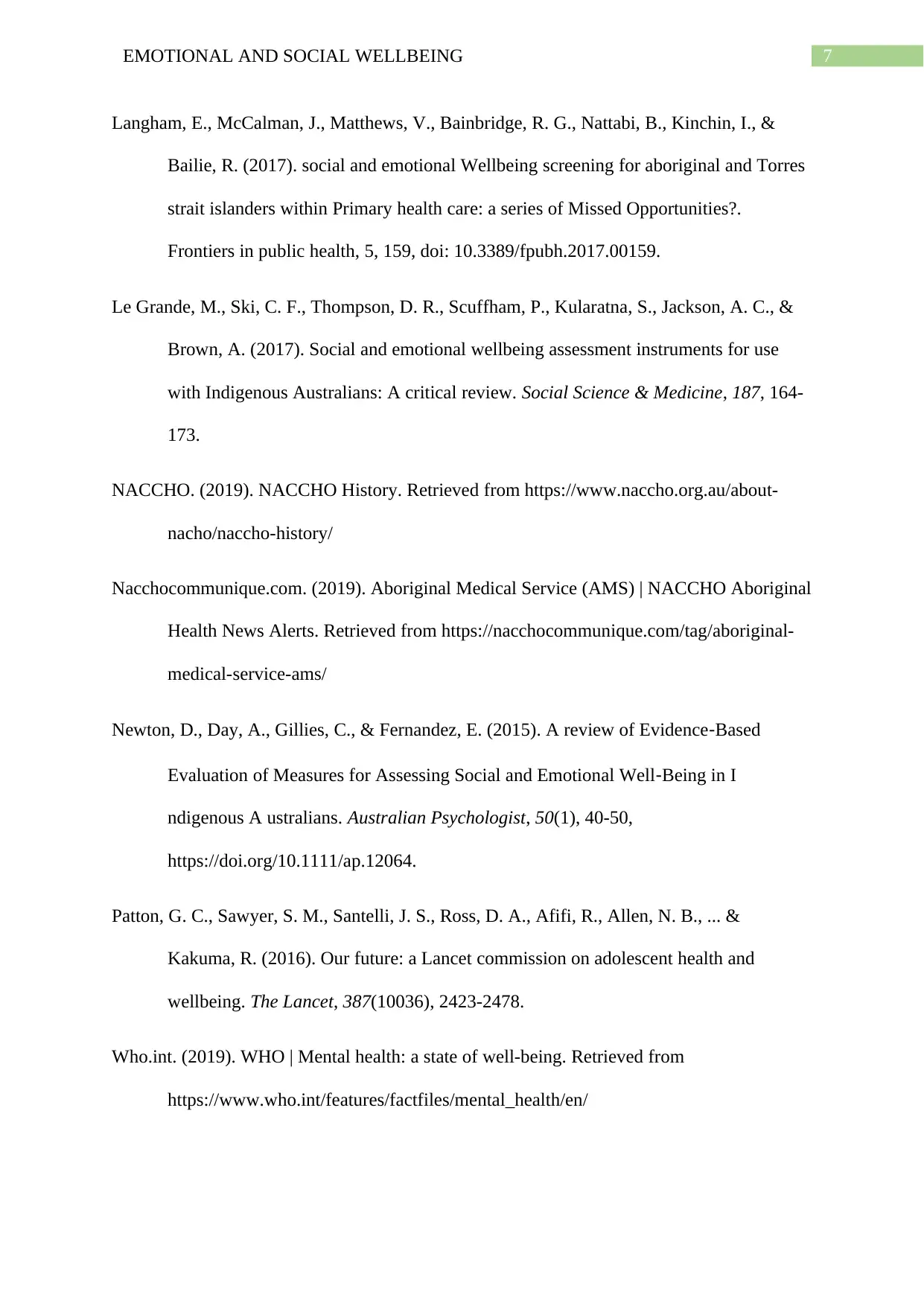
7EMOTIONAL AND SOCIAL WELLBEING
Langham, E., McCalman, J., Matthews, V., Bainbridge, R. G., Nattabi, B., Kinchin, I., &
Bailie, R. (2017). social and emotional Wellbeing screening for aboriginal and Torres
strait islanders within Primary health care: a series of Missed Opportunities?.
Frontiers in public health, 5, 159, doi: 10.3389/fpubh.2017.00159.
Le Grande, M., Ski, C. F., Thompson, D. R., Scuffham, P., Kularatna, S., Jackson, A. C., &
Brown, A. (2017). Social and emotional wellbeing assessment instruments for use
with Indigenous Australians: A critical review. Social Science & Medicine, 187, 164-
173.
NACCHO. (2019). NACCHO History. Retrieved from https://www.naccho.org.au/about-
nacho/naccho-history/
Nacchocommunique.com. (2019). Aboriginal Medical Service (AMS) | NACCHO Aboriginal
Health News Alerts. Retrieved from https://nacchocommunique.com/tag/aboriginal-
medical-service-ams/
Newton, D., Day, A., Gillies, C., & Fernandez, E. (2015). A review of Evidence‐Based
Evaluation of Measures for Assessing Social and Emotional Well‐Being in I
ndigenous A ustralians. Australian Psychologist, 50(1), 40-50,
https://doi.org/10.1111/ap.12064.
Patton, G. C., Sawyer, S. M., Santelli, J. S., Ross, D. A., Afifi, R., Allen, N. B., ... &
Kakuma, R. (2016). Our future: a Lancet commission on adolescent health and
wellbeing. The Lancet, 387(10036), 2423-2478.
Who.int. (2019). WHO | Mental health: a state of well-being. Retrieved from
https://www.who.int/features/factfiles/mental_health/en/
Langham, E., McCalman, J., Matthews, V., Bainbridge, R. G., Nattabi, B., Kinchin, I., &
Bailie, R. (2017). social and emotional Wellbeing screening for aboriginal and Torres
strait islanders within Primary health care: a series of Missed Opportunities?.
Frontiers in public health, 5, 159, doi: 10.3389/fpubh.2017.00159.
Le Grande, M., Ski, C. F., Thompson, D. R., Scuffham, P., Kularatna, S., Jackson, A. C., &
Brown, A. (2017). Social and emotional wellbeing assessment instruments for use
with Indigenous Australians: A critical review. Social Science & Medicine, 187, 164-
173.
NACCHO. (2019). NACCHO History. Retrieved from https://www.naccho.org.au/about-
nacho/naccho-history/
Nacchocommunique.com. (2019). Aboriginal Medical Service (AMS) | NACCHO Aboriginal
Health News Alerts. Retrieved from https://nacchocommunique.com/tag/aboriginal-
medical-service-ams/
Newton, D., Day, A., Gillies, C., & Fernandez, E. (2015). A review of Evidence‐Based
Evaluation of Measures for Assessing Social and Emotional Well‐Being in I
ndigenous A ustralians. Australian Psychologist, 50(1), 40-50,
https://doi.org/10.1111/ap.12064.
Patton, G. C., Sawyer, S. M., Santelli, J. S., Ross, D. A., Afifi, R., Allen, N. B., ... &
Kakuma, R. (2016). Our future: a Lancet commission on adolescent health and
wellbeing. The Lancet, 387(10036), 2423-2478.
Who.int. (2019). WHO | Mental health: a state of well-being. Retrieved from
https://www.who.int/features/factfiles/mental_health/en/
1 out of 8
Related Documents
Your All-in-One AI-Powered Toolkit for Academic Success.
+13062052269
info@desklib.com
Available 24*7 on WhatsApp / Email
![[object Object]](/_next/static/media/star-bottom.7253800d.svg)
Unlock your academic potential
Copyright © 2020–2026 A2Z Services. All Rights Reserved. Developed and managed by ZUCOL.





